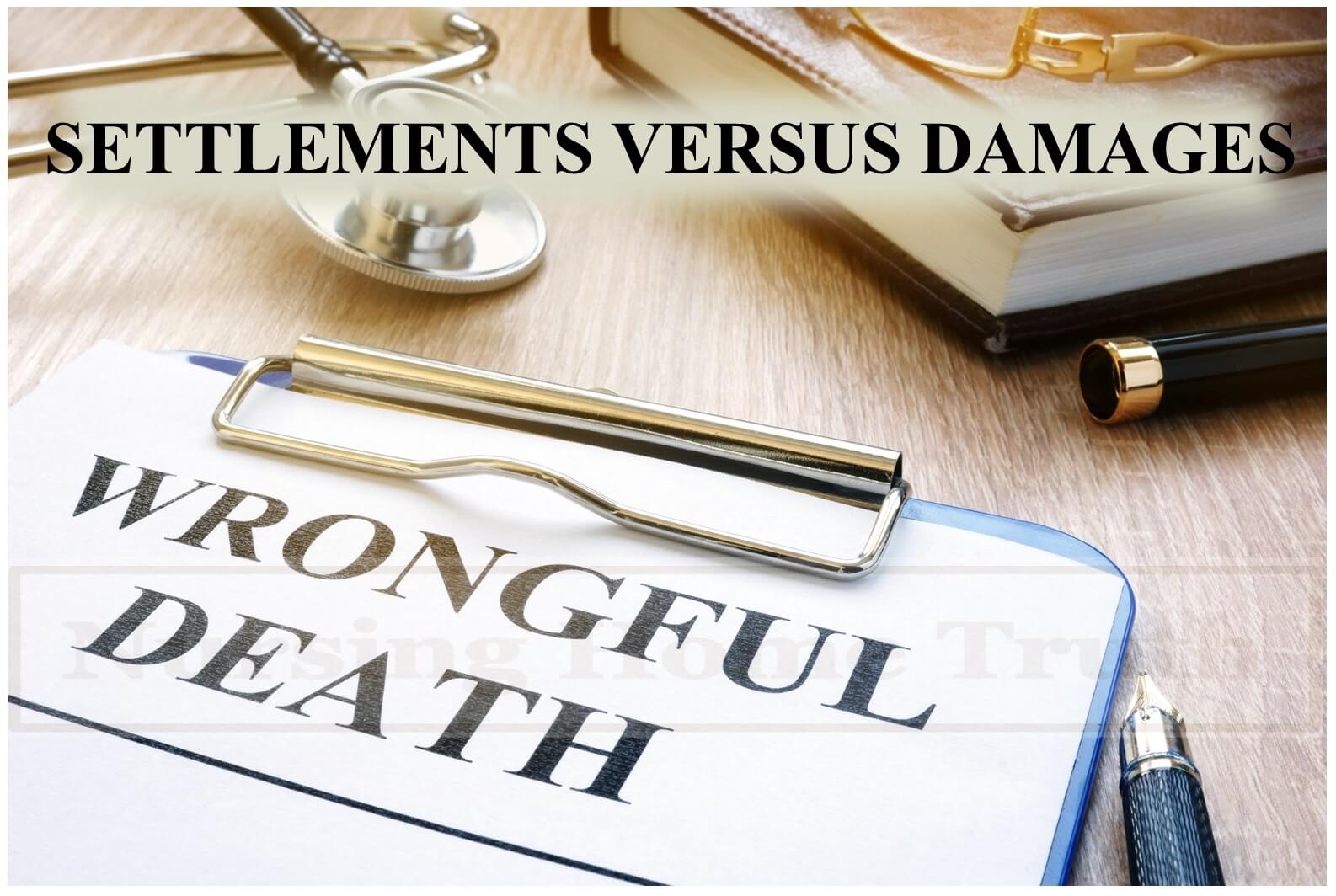Article Updated: March 4, 2022
Are Wrongful Death Settlements Taxable ?
Having settled wrongful death cases for dozens of clients, I get asked this question all the time.
If you are asking this question, I hope it means that justice prevailed and you recovered an adequate wrongful death settlement.
To gain my insights on the taxability of wrongful death settlements, continue reading below.
Clickable Table of Contents
Are Wrongful Death Settlements Taxable
1 – Wrongful Death Settlements
2 – Is My Wrongful Death Settlement Taxable?
3 – When Are Wrongful Death Settlements Taxable?
4 – Wrongful Death Settlement Q&A
Resources
5 – Get Help With Your Wrongful Death Settlement
6 – Supporting Literature, Citations & Research
7 – About the Author
8 – Legal Help in Maryland & Nationally
Wrongful Death Settlements
A settlement refers to a dispute resolution that happens in a voluntary manner and ends related litigation.
Settlements can happen in court for a variety of civil disputes ranging from emotional damage, wrongful terminations, and wrongful deaths.
A wrongful death settlement is specifically about a civil dispute that ends with an agreement that voluntarily dismisses any related litigation.
These settlements not only end the related litigation, but have included a sum of money that is greed to paid that tends to remain private.
Wrongful death settlements are usually a large amount of money and this brings up questions of how this influx of money is treated by the IRS and how, or if, it is going to be taxed.
Are Legal Settlements Generally Taxable?
Not all settlements are the same. Some may be taxable and others may not need to be taxed at all. The IRS has specific guidelines dictating this so that you know how to list your settlement and what to expect in the tax process.
Firstly, if you received a court settlement, you may receive a Form 1099-MISC which is used to report miscellaneous income, such as settlements.
Just because you received this does not mean that you automatically are in need of paying taxes and you should check with an attorney or accountant before you list a settlement as a taxable part of your income.
Some segments of your settlement may be taxable, and other segments may not be taxable.
An example of this can be seen with settlements for medical expenses, as these are tax-free generally, but settlement interest which accrues on unpaid settlements are taxable.
Settlements Versus Damages
There are some states that are generally more favorable towards plaintiffs regarding the ability to recover damages or settlements. But is there a difference in tax payment in a settlement versus a damage payment?

A settlement is an agreement between two sides in a dispute while damages are imposed on someone through the courts when there has been a violation of a right or a breach of duty.
Damages can be either punitive or compensatory, but one difference in damages compared to a settlement is that the need to pay taxes are different.
For example, in the state of California a wrongful death settlement is not taxable but punitive damages awarded related to the wrongful death settlement may itself be taxable. In other contexts, lost wages may be taxable, while pain and suffering is not.
If this sounds complicated, that’s because it is. A single case may have a non-taxable settlement as well as a taxable damages all at the same time.
Is My Wrongful Death Settlement Taxable?
According to the most general rules that the IRS has in place, a wrongful death settlement is not taxable. The IRS has rules, such as Rule 1.104-1 which dictate the tax rules for a settlement.
The connection between the monetary amount being taxable or not rests largely in the nature of the physical injury itself, with an emphasis on the word physical.
The IRS for the purposes of taxes breaks settlements into two groups: physical and non-physical.
In these groups there are physical injuries, emotional distress from the original injury and punitive damages.
The IRS makes wrongful death settlements non-taxable because these are classified as claims that are resulting from physical or personal injuries. However, if part of the wrongful death proceeds are for taxable components which extend beyond physical injuries, such as lost income and punitive damages, then the answer is both yes and no – your wrongful death settlement has both taxable and non-taxable components.
Changes are always taking place in settlement law, but as of 1996, the word physical has played a large role in determining the taxability of a settlement for wrongful death. Court Assignment Of Wrongful Death
Court Assignment Of Wrongful Death
Court assignment of awards in court can impact your settlement taxability.
Many factors and assignments can have this impact such as the loss of financial support that is caused because of the wrongful death.
Mental anguish can also caused because of a wrongful death.
Other variables that can have an impact include:
◊ Costs of funeral expenses
◊ Loss of companionship caused by the wrongful death
◊ Loss of the contributions that your loved one made to the home
◊ Future contributions that your loved one would have been able to make
Depending on the way that the settlement is awarded, assigned and broken down, can cause portions of it to become taxable, but still generally not all of it.
When Are Wrongful Death Settlements Taxable?
While wrongful death settlements are not usually taxable, there are some situations in which parts of it are.
Some possible areas, or parts of your wrongful death settlement that may be taxable include:
◊The segment of the settlement that was deducted in previous years’ expenses paid towards medical bills and expenses.
◊Lost wage or income recoveries.
◊Lawsuit settlements that are assigned or classified as punitive damages.
It is important to understand that even if the larger wrongful death settlement is generally non-taxable, parts of it may be.
Consulting with an attorney or an accountant regarding your wrongful death settlement is therefore highly important because a single settlement may need to be broken down into multiple smaller segments to understand what is, and what is not taxable.
Bodily Harm & Taxability
So, are wrongful death settlements taxable? The answer, you now know, is yes and no, because the specific details of each case will have elements of punitive damages, physical and non-physical injury elements and issues regarding bodily harm.
Settlements related to the ability to show “observable bodily harm” tend to not be taxable.
Emotional distress on the other hand in some cases may be taxable, and in other cases may not be taxable depending on the specifics of the emotional injury itself.
Wrongful Death Settlement Q&A
What types of settlements are not-taxable?
Generally speaking, certain types of settlements are tax-deductible such as wrongful death settlements and emotional distress related to bodily harm settlement cases.
Are punitive damages different from settlements?
A settlement refers to when there is an agreement between two parties to a conclusion to a civil case. On the other hand, a punitive damage is imposed on one party in a civil case through the courts and is therefore not voluntary like the conclusion of a settlement.
When are wrongful death settlements taxable?
Wrongful death settlements are usually not taxed as the IRS has listed them as non-taxable segments of income.
Is an emotional distress payment tax-deductible?
Emotional distress payments are able to be either taxable or non-taxable depending on the relationship that they have to personal physical injuries.
Get Help With Your Wrongful Death Settlement
When dealing with the wrongful death of a loved one, the last thing you want to deal with on top of that is the complicated world of tax laws.
I have the experience you need to understand and navigate the tax-codes related to wrongful death settlement taxability.
If you already have a lawyer who is handling or settling your claim, you should call that lawyer for help. If you do not have a lawyer and need professional insight for resolving a wrongful death case, I invite you to reach me day or night for a free consultation.
You can send a message through my personal email or fill out the contact form below.
Warmly,
Reza Davani, Esq.
State Bar No.: 1212110211
Federal Bar No.: 30168

Supporting Literature, Citations & Resources:
IRS (2021). Tax Implications of Settlements and Judgments
California Legislative Information (2021). SB-447 Civil actions: decedent’s cause of action.
Hurwitz, D.S. (2022). California’s SB 447 – Increasing the Danger in One of the Country’s Most Favorable Venues for Personal Injury Plaintiffs
About the Author
This nursing home and medical malpractice article was written by Baltimore, Maryland nursing home attorney Reza Davani, Esquire. Mr. Davani received his Juris Doctor degree from a Tier 1 law school, the University of Maryland Francs King Carey School of Law. He received his first license to practice law from the State of Maryland’s Court of Appeals (MD State License No. 1212110211), and just four months later received a federal law license from the United States District Court for the District of Maryland (Federal License No. 30168).
Mr. Davani has been practicing law for over 10 years. He began practicing law by helping clients as a sanctioned student lawyer before receiving his law license, and second chaired his first jury trial in federal court before even graduating law school. He is a registered member of the Maryland Association for Justice (MAJ), the American Bar Association (ABA), the American Association for Justice (AAJ), and was formerly on the MAJ’s Legislative Leader’s Circle.
Mr. Davani has taken over 20 cases to trial in state and federal court, and favorably settled well over 100 cases for injured victims. He has personally helped his clients recover over $15,000,000 in personal injury, medical malpractice, and nursing home abuse settlements and verdicts in Maryland and other states. He is dedicated to fighting for justice, and welcomes the opportunity to help you.
Wrongful Death Lawyer Near You in Baltimore, Maryland & Beyond
I can help you anywhere in Maryland, including Allegany County, Anne Arundel County, Baltimore City, Baltimore County, Carroll County, Calvert County, Caroline County, Cecil County, Charles County, Dorchester County, Frederick County, Garrett County, Harford County, Howard County, Kent County, Montgomery County, Prince George’s County, Queen Anne’s County, Somerset County, St. Mary’s County, Talbot County, Washington County, Wicomico County, and Worcester County.
I have helped clients in over a dozen jurisdictions, including California, Delaware, District of Columbia, Georgia, Illinois, Iowa, Massachusetts, Maryland, Mississippi, New Jersey, New Mexico, New York, North Carolina, Pennsylvania, South Carolina, Washington, and Virginia.
I help injured victims nationwide in all 50 states on a case-by-case basis via Pro Hac Vice.




